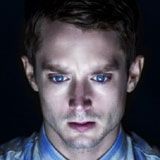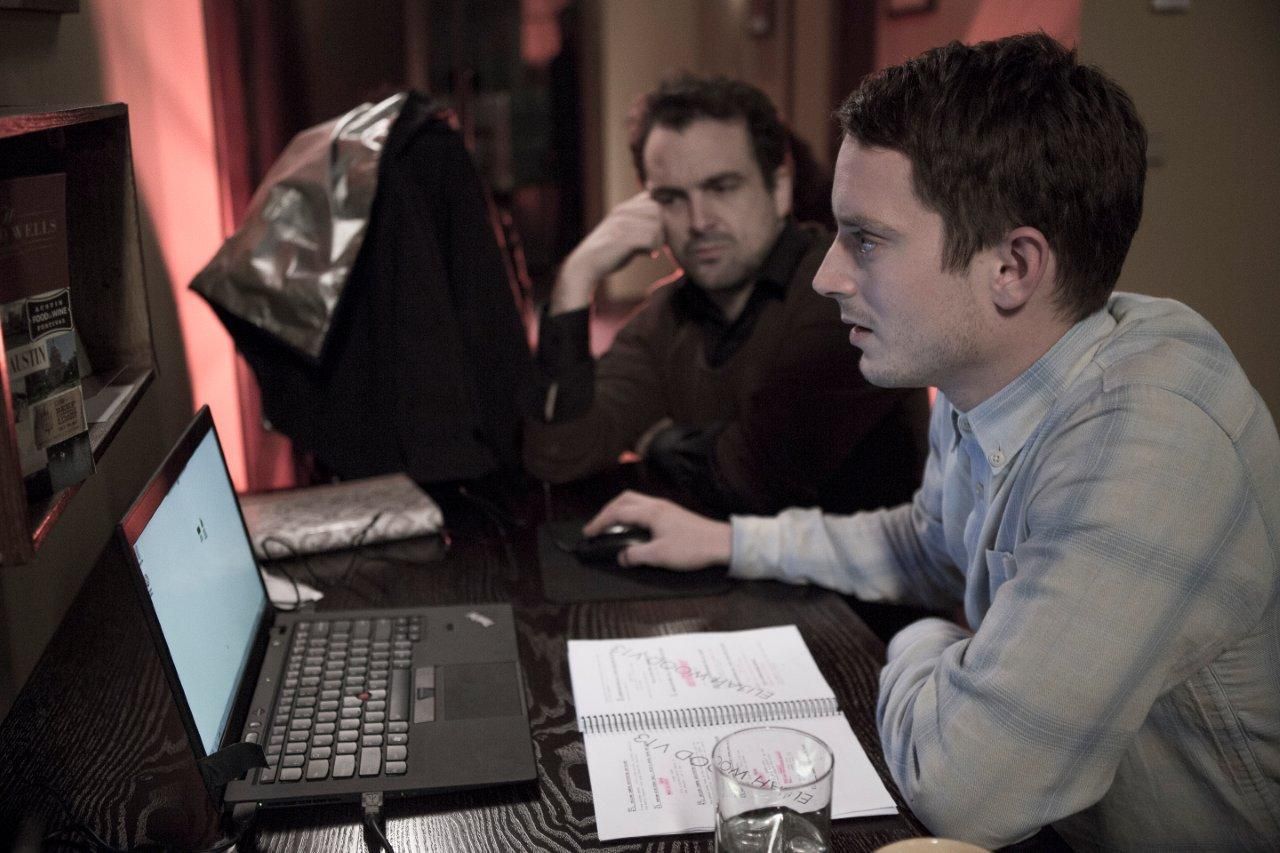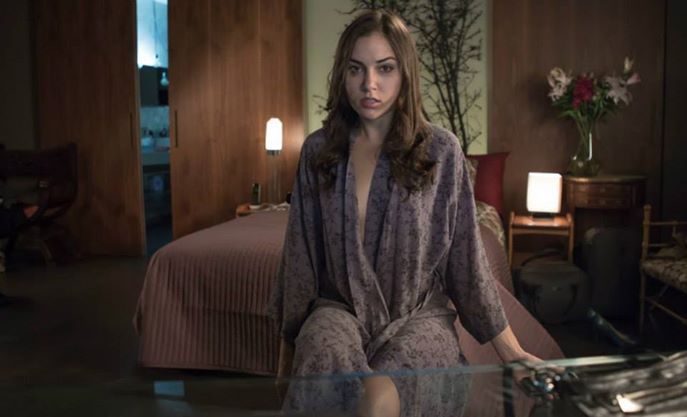There's acting for the big screen and acting for the screen, but Elijah Wood may have just broken ground performing for computer windows.
Working in tandem with the adventurous Spanish filmmaker Nacho Vigalondo (Timecrimes, Extraterrestrial), Wood takes on an intriguing technical challenge in the new film Open Windows. The thriller is built around a devilishly inventive visual hook: Everything the audience sees appears as if on a computer screen, unfolding in real time, with a variety of opening and closing browser windows offering multiple perspectives on different characters, locales and plot machinations simultaneously.
Wood plays the fan blogger behind a website celebrating a young A-list actress (played by Sasha Grey) who believes he's been invited to have a private dinner with her but is instead sucked into a dark and Byzantine cyber-thrill ride that takes Hitchcockian voyeurism to high-tech heights.
Wood and Vigalondo were wired in for an interview with Spinoff Online, in which they discussed their new storytelling landscape.
Spinoff Online: Elijah, I've really been enjoying the choices you've been making as an actor and the projects you've been jumping aboard. They're quite adventurous. What was the lure to this one particularly, and what's been your overall philosophy lately about the kinds of projects you want to be involved in?
Elijah Wood: Well, this was kind of two-fold, really: I've been an admirer of Nacho's work since Timecrimes, since I first saw that film, so I wanted to work with him, just as a director and as a cinematic artist that I admire. And then I came to know him through coming to Fantastic Fest two years in a row and hanging out and watching movies together and singing karaoke – we actually do a fantastic set! And so on a base level, I just simply wanted to work with him. I think he's a fascinating filmmaker, and a visionary in the way that he approaches it.
And then there was the project, which I'd heard about. I'd heard about the nugget of the idea, I think, maybe back in like 2011, the idea of Nacho making a film that's a thriller that takes place entirely on a computer screen was an insane idea [laughs] – I was completely intrigued at the challenges of how one could actually tell a story utilizing that medium. And then it all kind of came into reality. So he worked on it, and ultimately asked if I wanted to read it and play the role. And I kind of jumped at the chance.
Part of what intrigued me about it was the challenge of the filmmaking, trying to make a film based on this sort of gimmick, this idea that the whole thing takes place on a computer screen that deals with the way that we communicate with each other online. And yet also tell a successful narrative within the context of that where you would hopefully forget about the gimmick entirely, which I think the movie actually manages to achieve. So a bit of the tactical aspect of the film I was excited about as well. I think I'm always drawn to things that present interesting challenges and are relatively different takes on storytelling. And so it's an exciting process to work on something that was so strange and different.
In regards to what this general philosophy is, my decisions are totally dictated by my heart and my gut and more often than not, from a filmmaking perspective rather than from the mind of an actor, I guess. I love cinema, and I love filmmaking, interesting filmmakers and unique visions and great experiences. So more often than not, I'm drawn to that, rather than just the character I want to play. So that tends to be the guiding principle, that when it came to this, it had to do a lot with doing something like when I did Grand Piano, the opportunity to work with Eugenio [Mira], had to do a lot to do with it as well. I'm more drawn to that, then specifically characters as an actor.
This film has such interesting things to say about the nature of fame, particularly through the lens of a non-famous person's feelings about the Internet and the sensation of thinking you know somebody who has notoriety. From both of you, I'd like to hear your feelings about that and personal experiences.
Wood: Yeah, well, I think the one thing that's unique about the Internet, certainly, it's the accessibility. We're all more accessible now, primarily because of social media, and to a certain degree it's a choice. We can certainly take ourselves off of that and not be accessible. I mean, I stayed away from Twitter for a long time for that very specific purpose. I just felt, "Whoa, why do I need to be out there?" A.) I don't really want to be writing my thoughts out to a million people [laughs]. Nobody needs tI hear that. And B.) to a certain degree, it takes a certain sense of responsibility, I think, to be that visible. I finally caved and got it, but I'm not that active on it. I can't just be Tweeting stuff. I think the internet is a place where we are a step removed from the things we do in the online space – it doesn't carry the sort of moral implications that an actual act or an actual vocalization in real life has.
Therefore, because of that sense of anonymity, people have this feeling that they can say or do whatever they like online, and it doesn't have real life implications. And I think we're obviously seeing the results of that in much broader way with seeing genuine consequences for those actions and those behaviors. I think that's a really good thing. It's ultimately a really good thing to have a dialogue about. And I think we can all relate to it. I think that's part of what the movie deals with. There's a moment in the film where Chord sends Nick a link, and he says "Click on this link." And he clicks on this link and he realizes that he's suddenly got access to that girl's cell phone camera and he can spy on her. And I think we can all relate to little moral indiscretions, where we just feel like "Ah, I can download this song," or "I can look at this photo." Because it's there and there's no one sort of standing over your shoulder saying no.
Nacho Vigalondo: No one knows you're watching.
Wood: Exactly. So you almost feel like there's no sense of accountability, and I think we can all relate to that on a certain level. And I think what we're seeing now is a much broader realization of where that can actually go and what the consequences can be.
Nacho, tell me about how you pulled this off on a technical level with so many moving parts. Did it take a ton of pre-production planning or more finding it in editing?
Vigalondo: It was like making an animated movie, like making an animated 3 D movie. We had pre-visualize the whole movie. So we were able to know when to shoot and how and where to say "Action," when we have to say "Cut," because we have a screen of information that goes out forever. Obviously, I can't shoot like in a car. We used improvisation in order to think about what to shoot and in which way. It's been a really exciting new process, not only also the improvisation, but also the shooting and the post-production. Especially the production, because we don't have a specific precedent about this. Basically, we had to create the way of making a movie like this.
I'm curious about the actual technical challenge for you, Elijah, because I'm assuming Nacho shot different elements and had them assembled in the editing process. What was it like for you to perform by yourself a lot – not that you haven't had that kind of experience on other films.
Wood: Yeah. I was very isolated [laughs]. It was very interesting. The first day was so revealing in regards to what the process was going to be. Just sitting in front of a camera and ultimately having to look at the camera lens and perform without anyone there. So interactions without actually having the people there on screen for me to look at, it all became very apparent what the process was going to be within that first couple of hours on the first day. And it took a bit getting used to. Even just doing a Skype call for people is weird: you're looking at a screen, but at least you have something to look at. But in this case, there was nobody. So it was extremely challenging. It was very technical. It was very specific what was happening on the screen at any given time on the laptop. So anything as simple as dragging a file from one place on a laptop to the other, required a specific note to do that at a specific time, because that's where my eyes would go. And that would then translate to that event happening on the computer screen.
So there were tons of these very specific, technical moments that we all had to pay attention to at all times. So each sequence, do we need something that would pop up on the laptop that I would then react to? And a lot of what helps us get through that and maintain our eye on all of those technical aspects that were current in any given time was our script supervisor who really helped us keep it all in line, because it's really difficult to remember the specificity of the way that these things actually occur in the context of the film. Obviously, I only have a camera to look at, and yet, there are all these events that are constantly occurring on the computer screen. It was honestly one of the most challenging films I've ever worked on in that regard.
I mean, the entire sequence from when my character leaves the hotel in the car to when he gets the warehouse at the end, so everything that takes place in the car was shot over three days in Austin, Texas – that's like basically the second act of the film was shot in three days. And they also went and shot plates so that driving shots and various plates to be used in the background or foreground of the car prior, cut the day before, so that I had an image to know which direction it's driving in. It was amazingly complicated – but also, a lot of fun.
Opening today in select theaters, Open Windows is also available for digital download and On Demand.




